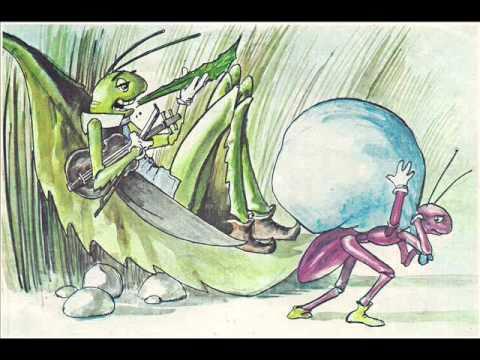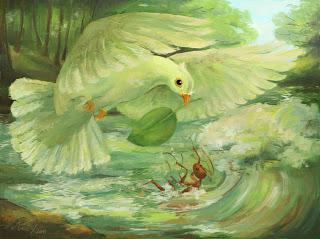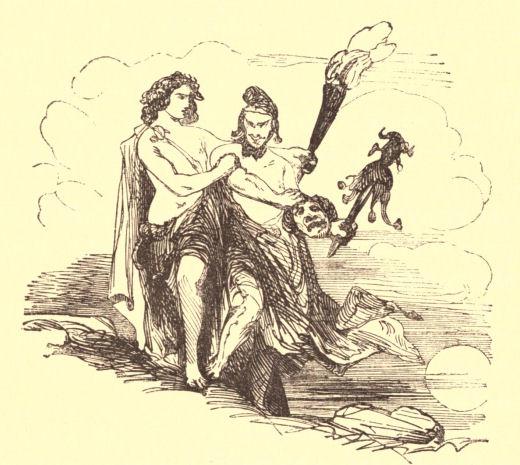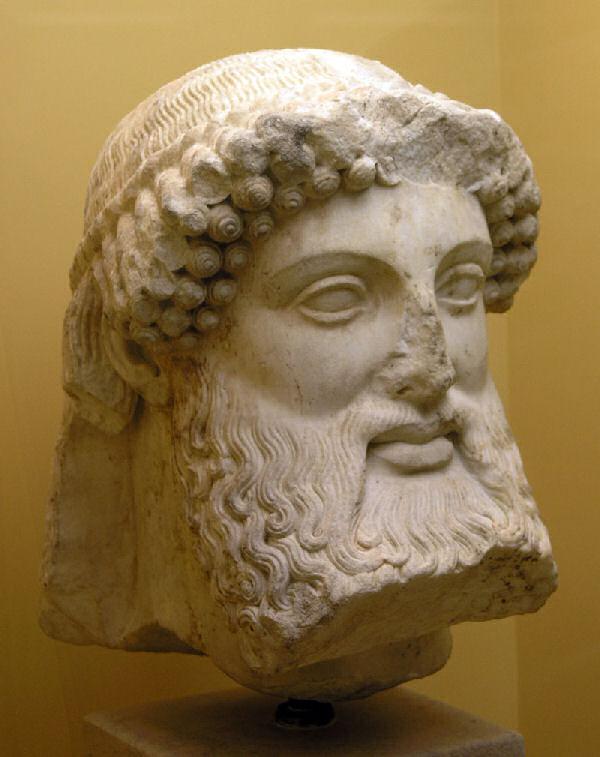16.The Ants and the Grasshopper
THE ANTS were spending a fine winter’s day drying grain they had gathered in the summertime. A grasshopper that was at the brink of starving with hunger passed by and begged for a little food. The ants asked him,
“Why didn’t you treasure up food during the summer?”
The grasshopper replied, “I didn’t have enough leisure for it. I passed the days in singing.”
They said, again, “If you were foolish enough to sing all the summer, you must dance supper less to bed in the winter.”
❖ Beset with difficulties, many stop breathing freely.
❖ The superior one tries to prepare for hard times later on, as he can perceive them in the coming.
❖IT IS BEST TO PREPARE FOR THE DAYS OF NECESSITY.
15.The Ant and the Dove
AN ANT went to the bank of a river to quench its thirst, and got carried away by the rushing stream. When he was on the point of drowning, a dove saw him from where she sat on a tree that was overhanging the water. She plucked a leaf and let it fall into the stream close to the ant. The ant climbed onto it and floated in safety to the bank.
Shortly afterwards a bird catcher came along. He placed himself under that tree and laid his lime-twigs for the dove in the branches. The ant understood what he was up to and stung him in the foot. In pain the bird catcher threw down the twigs, and the noise made the dove take wing.
❖ One good turn deserves another.
14.Sir Success, Sir Voyager, Lady Minerva, and Momus
ACCORDING to an ancient legend, the first man was made by Sir Success, the first bull by his brother, Sir Voyager, and the first house by the musical Lady Minerva. After completed their labors, a dispute arose among them as to which had made the most perfect work. They agreed to appoint a certain man, Momus, as judge, and to abide by his decision. Momus, however, was very envious of the handicraft of each, and found fault with all.
First he blamed the work of Sir Voyager because he had not made the horns of the bull below his eyes, so he might better see where to strike.
He then condemned the work of Sir Success, because he had not placed the heart of man on the outside so that everyone might read the thoughts of the evil disposed and take precautions against the intended mischief.
And, lastly, he protested against Lady Minerva because she had not contrived iron wheels in the foundation of her house, so its inhabitants might more easily remove if a neighbor proved to be unpleasant.
Sir Success became indignant at such inveterate faultfinding, drove him from his office of judge, and expelled him from the mansions of the lords where he was settled.
❖ Judge well yourself before you criticize.
❖ One should neither judge beings nor works of art by invented defects.
❖ Gently to hear, kindly to judge.
13.Mercury and the Traveler
A man, about to depart upon a long journey, prayed to the god Mercury, who was anciently supposed to speed travelers, to give him good voyage and a safe return. He promised Mercury that if he would grant his request he would give the god half of everything he might find on his road.
Soon after he set forth, he found a bag of dates and almonds which some passerby had lost. He ate all but the stones of the dates and the shells of the almonds at once. These he laid upon a wayside altar to the god, praying to him to take notice that he had kept his promise.
“For,” said he, “here are the insides of the one and the outsides of the other, and that makes up your half of the booty.”
A promise-breaker is never at a loss for an excuse.





